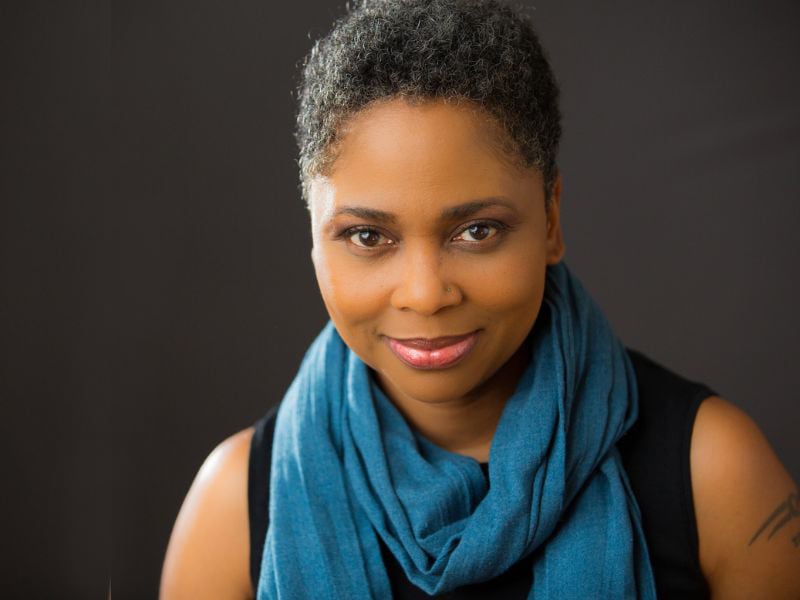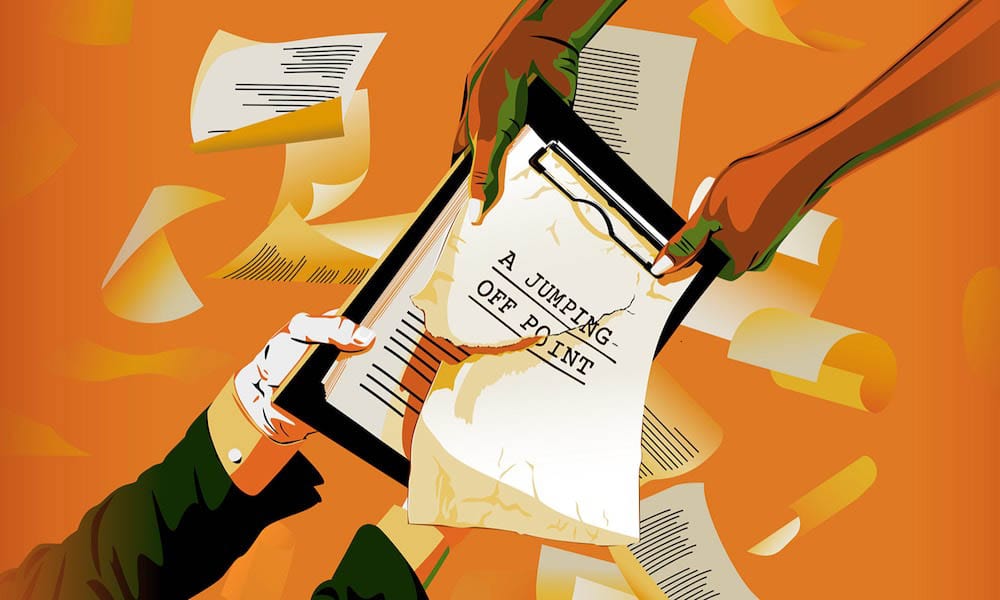Round House Theatre is premiering Inda Craig-Galván’s play A Jumping-Off Point. In it, a promising African American writer, Leslie Wallace, is confronted by Andrew, a white man from her graduate school days, who accuses her of using his script that he submitted for a school project about Black characters, rewriting it, and claiming authorship. “Their confrontation — and eventual uneasy alliance — forces a reckoning on representation, privilege, and who gets to tell what kinds of stories,” says the program. “Full of humor and complex characters, A Jumping-Off Point is a sharp and electric new play from rising star playwright and screenwriter Inda Craig-Galván.”
I got a chance to talk to playwright Inda Craig-Galván about the script’s major premise — what happens when an original writer’s efforts end and a different writer takes over, using the same or similar issues, and considers it their work? (This conversation has been edited for length and clarity.)

We’re excited to see the world premiere of A Jumping-Off Point. Have there been any readings before the show got on its feet at Round House?
Inda Craig-Galván: The only reading of the play was at the San Francisco Bay Area Playwrights’ Festival, as part of some developmental work there. That’s where Naysan Mojgani [associate artistic director at Round House] saw it and the theater almost immediately contacted me indicating they wanted to produce it. My only other interaction with Round House was earlier that year: they had been reading some of my work and they offered me a commission to write a new play. So that was already in the works, for me to work on a new piece, with no production plans of course; that’s an entirely separate selection process. The purpose of the commission is to encourage new writers to get new work out and then see where it goes from there. I’m very pleased to have been selected to be part of Round House’s new play festival.
Considering “ownership” in describing aspects of history is so significant. What was your catalyst in selecting this message and theme for a play?
I had an experience in graduate school where a white male fellow writer in our cohort felt totally justified in submitting some things outside of his life experience that made me uncomfortable. He became the inspiration for the character Andrew. The person’s lackadaisical work habits, questionable work ethic, and the subject matter he selected were not compatible with my approach and respect for cultural experiences.
This person extended beyond his own realm of experience with no qualms about the lack of research or anything, just because he felt he could. Out of frustration about that mentality, I wrote the first draft of the play while I was in school. Years later when I started working in television and experienced the dynamics of the “writers’ room,” I was able to layer that into the script. Fictionalized aspects of the play of someone telling someone else’s experience raise questions about who has the right to tell other people’s stories.
I’m guessing there’s some universality in the Andrew character, someone who felt privileged enough to write about others’ experiences without sufficient research, care, or respect for entire nationalities, just because they can.
Yes, that’s the feedback we’ve been hearing in the workshops. People can relate to the situation because they’ve experienced their own “Andrews” at work or in school classes. It’s been fun seeing how the character resonates in all kinds of settings.
At the same time, you don’t make him a villain. Andrew is likable and makes some really important points about his right to write about whatever he chooses.
Yes, I don’t subscribe to writing good versus bad guys, villains or heroes. I find it more interesting and believable to write characters as human, caught in the same dilemmas and decision points that we all deal with every day. I worked on finding Andrew’s humanity, finding a way to explain his choices, who he is, his journey.
That’s what makes the interchanges real, fully imagined as real people.
You’re so prolific, this is one of almost ten plays you’ve written! Are there key themes throughout your plays that are revealed in A Jumping-Off Point?
I guess looking back you’ll see I am committed to presenting strong African American female protagonists. I’m drawn to creating real-life stories, imagining conversations with real people, and blending in social, geopolitical, cultural, geographical aspects
The show features two friends, Leslie and Miriam, who are there for each other, an Oprah-and-Gail duo. Unfortunately, this kind of deep caring friendship is not portrayed enough. Give us an idea of what you were trying to accomplish with the friendship between these two characters and why.
I’m fortunate enough to have had great girlfriends who have been there for me through thick and thin and I wanted to portray that kind of relationship. I know how good that feels to be supported and what it takes in time and commitment to be that kind of friend to others, to have friends we are not in competition with, friends who are there to support and love, laugh with. These characters have a strong established friendship from their college years. They know and “get” each other. Miriam is the more grounded spirit. Leslie is higher strung, a lot more career intense, and they care for each other deeply.
There’s a level of trust you have to have to know someone’s got your back and will call you out and get in your face when needed. And that’s what I wanted to get across as reflected in the life experiences between these two women.
The show’s got great casting! The Washington metro audience is familiar with Nikkole Salter, who’ll be playing Leslie. Also performing are Cristina Pitter as Miriam and Danny Gavigan as Andrew.
Yes, the casting is superb, the direction by Jade King Carroll and all the design elements work beautifully. It’s been a thrill being here watching the show come together and get on its feet for this world premiere.
What is your experience with the “writers’ room” and the impact of social media on your work and creativity?
So far, I’ve had great experiences in the writers’ room — it seems to be working. There’s all kinds of creativity that happens in that space. It’s a little ecosystem, a little world of its own, filled with people from vastly different backgrounds and experiences all working together to create something that people from all over will see. With so much happening in the world, there’s still the need for art and entertainment. Theater helps you go outside of yourself for brief moments, see things differently, and get refreshing new perspectives. Listening and working on projects with creative people like that and attending theater helps our perspective zoom out to see the whole planet filled with different experiences. It’s very gratifying and makes me very happy to be doing what I do.
Switching to social media, when the confrontation between Andrew and Leslie mounts, there’s a line in the play where Miriam says, “Just wait until social media gets ahold of this.” It’s such a scary thing to know that somebody can take something totally out of context, get one person’s spin on it — even something self-published in a tiny online article, no matter when or where, if it’s out there, somebody can take it — reframe it however they want, and repost it. Then other online publications can scoop that up, maybe paraphrase it, maybe not, and then the public will think it’s true. It’s the Wild West out there!
A popular saying is: use social media, don’t let social media use you. It’s a real fear that the character Leslie has to deal with, and it kind of forces her hand in how to navigate the tricky situation she finds herself in. The moral of the story: don’t always believe what you read on social media.
You’re so right. The script focuses on such relevant topics. In so many cases, we’re still trying to figure out: Whose story is it? Who has the right to tell the story? And where do you draw the line with a “jumping-off point,” where someone created something, and then someone else takes it and rewrites it, or creates an entirely different piece? What is a “jumping-off point”? It can be a bit ambiguous trying to untangle and differentiate where one writer’s work ends and another’s begins.
Yes, it’s a term commonly used in writer circles. Say somebody wants to adapt a book, turn it into a film or TV show, or pitch for one, they’ll use the book as a “jumping-off point.” What they’re saying is we want the essence of the book but you don’t have to stick closely to it. In that case, the new writer would have the latitude to make it their own and make the material more useable to a larger audience. That’s as long as the original writer is acknowledged and in agreement.
I imagine that’s where it can get murky.
As to who owns the story, who can do what with it, I don’t think it’s that difficult. If someone decides to write about people other than their own natural base community, and they haven’t done the work or research to delve into that community with craft, research, and respect, I would suggest they reconsider and even walk away. There are other stories they can tell to be more authentic and come from a more genuine place. We need to tell our own stories.
That is so true. We’re thrilled that Round House is producing this world premiere so we can discover and share insights together. You’ve been part of the development process through Zoom and are now here on site for final touches and opening. Do you have any message for the Washington, DC, audience to come out and see A Jumping-Off Point?
Despite a couple of stormy days, I’ll hopefully see a couple of cherry blossoms that might be holding on! [Both laugh.] Round House is such a beautiful inviting venue. They do so much outreach and community engagement, really bringing people in. They work with teens and new play development. I hope the Washington, DC, metro audience will come out and enjoy the space, share together, and talk about the issues that affect us all.
Running Time: Approximately 90 minutes with no intermission.
A Jumping-Off Point plays through May 5, 2024, at Round House Theatre, 4545 East-West Highway, Bethesda, MD. For tickets ($46–$83), call the box office at 240-644-1100 or go online. (Learn more about special discounts here, accessibility here, and the Free Play program for students here.)
The playbill for A Jumping-Off Point is online here.
COVID Safety: Round House Theatre no longer requires that audience members wear masks for most performances. However, masks are required for the following performances: April 30 (evening) and May 4 (matinee). Round House’s complete Health and Safety policy is here.
SEE ALSO:
Round House announces 3rd annual National Capital New Play Festival (news story, March 21, 2024)
The National Capital New Play Festival runs from April 10 to May 5, 2024, at Round House Theatre, 4545 East-West Highway, Bethesda, MD. For full festival information and tickets, visit Round House’s website here or call the box office at 240-644-1140. (Most free readings are sold out. You can join the waiting list by calling or emailing the box office and then arriving at the theater 90 minutes before each performance to claim tickets as they become available.)





